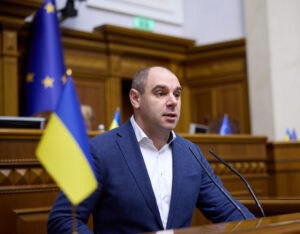
Following a meeting with Portuguese Prime Minister Luís Montenegro, Ukrainian Prime Minister Yulia Svyrydenko announced the country’s first contribution to the Energy Support Fund for Ukraine in the amount of EUR600,000.
“During the meeting, the Prime Minister of Portugal announced the first contribution to the Energy Support Fund for Ukraine in the amount of EUR600,000. We highly appreciate this step by our partners,” the Telegram message said.
The parties also discussed Portugal’s defense support for Ukraine, in particular through the PURL and SAFE mechanisms, as well as the Build in Ukraine and Build with Ukraine initiatives, which have significant potential for developing cooperation, particularly in the field of joint drone production.
In the context of preparations for the next Conference on the Reconstruction of Ukraine, the parties agreed to work on the conclusion of an intergovernmental agreement (G2G) to promote the involvement of Portuguese business and investment in the Ukrainian market.
“I also emphasized to the Prime Minister that Ukraine is grateful to the leaders of the European Union for their decision to provide Ukraine with EUR 90 billion in funding over two years — this is incredibly important assistance for Ukraine,” the Prime Minister stressed.

According to Serbian Economist, Montenegro’s state-owned energy company Elektroprivreda Crne Gore (EPCG) has announced the installation of Europe’s largest wind turbine at the Gvozd wind farm, which is currently under construction, marking the project’s transition to its final phase, Montenegrin media reported, citing a statement from the company.
According to EPCG, the first 7 MW wind turbine with a tower height of about 120 m and blades 85 m long has been successfully installed at the Gvozd wind farm site. The company specified that upon completion of pre-installation work and equipment delivery in the coming weeks, the accelerated installation of the remaining units will begin, followed by trial operation and final technical testing of the entire complex.
EPCG notes that the Gvoz wind farm should significantly improve the stability and reliability of Montenegro’s energy system, increase the share of renewable sources in the generation structure and further strengthen the country’s position as one of the regional leaders in green energy transformation. The project is being implemented in accordance with European technical, environmental and safety standards.
EPCG Chairman of the Board Milutin Djukanovic said that the installation of the largest wind turbine in Europe confirms Montenegro’s ability to implement projects comparable in scale and technology to the most advanced energy systems in the EU.
EPCG previously reported that upon completion, the Gvozde wind farm will generate approximately 150 GWh of electricity per year, which will cover the consumption of about 25,000 households without the use of subsidies from the state budget.

Former Energy Minister Herman Galushchenko was a member of a criminal organization involved in large-scale money laundering, in particular at NAEK Energoatom, which was exposed as part of the NABU/SAP operation “Midas.” He was given the pseudonyms ‘Sigismund’ or “Professor,” according to SAPO prosecutor Serhiy Savitsky.
“All members of the criminal organization were aware of the risk of exposure, so pseudonyms were established for individuals for the purpose of conspiracy. For the Minister of Energy – ‘Sigismund’ or, in conversation with Mironyuk and Basov – ”Professor,“ for Deputy Prime Minister Chernyshov – Che Guevara,” Savitsky said while reading the Midas case materials in the High Anti-Corruption Court, which is currently deciding on a preventive measure for one of the defendants in the case, Igor Mironyuk.
In the NABU/SAPO investigation, he is referred to as a former advisor to the Minister of Energy.
Mironyuk himself called himself Galushchenko’s lawyer in court.
The SAPO prosecutor also noted that Timur Mindich, whom the PO participants called its leader, like Mikhail Zuckerman, had influence over Galushchenko and former Defense Minister Rustem Umerov.
The SAPO prosecutor is requesting that Myronyuk be taken into custody as a preventive measure due to the risk of him fleeing abroad.
As reported, one of the figures in the case, a member of the National Commission for State Regulation of Energy and Public Utilities (NKREKU), left Ukraine last night. Sources from the Energorforma internet portal in the government claim that he had been approved for a business trip to Warsaw until the end of the week. We are awaiting a response to the official request from the NEURC.

The National Anti-Corruption Bureau of Ukraine (NABU) and the Specialized Anti-Corruption Prosecutor’s Office (SAP) are conducting a large-scale operation to expose corruption in the energy sector, according to a report on NABU’s Telegram channel on Monday morning.
“15 months of work and 1,000 hours of audio recordings. The activities of a high-level criminal organization have been documented. Its members have built a large-scale corruption scheme to influence strategic enterprises in the public sector, in particular JSC ”NAEK “Energoatom.” Details to follow,” the message says.
A message with identical content was published on the SAP’s Telegram channel.
Earlier, the media and MP Yaroslav Zheleznyak (Golos faction) reported on searches at the home of Timur Mindich, co-owner of the Kvartal 95 studio, Minister of Justice Herman Galushchenko, and at NAEK Energoatom JSC.
Zheleznyak said that the statement on corruption at Energoatom was filed by him and his colleagues. According to the MP, “Mindyich, Herman, Energoatom — all are in our investigation and in one subsequent statement to NABU.”
Later, he wrote in a telegram that “this is not all.”

171 enterprises and communities from 14 regions of Ukraine have used the simplified procedure for changing the designated use of agricultural land to industrial and energy land for the construction of new enterprises and power plants. This was announced at the Kyiv International Economic Forum by Dmytro Kysylevskyi, Deputy Head of the Verkhovna Rada Committee on Economic Development. He is the author of the law that reduced the duration of changing the designated land use from 1–3 years to 1.5 months.
Decisions to change the designated purpose of land under the simplified procedure have been adopted for the construction of production and warehouse facilities (75 plots), production of energy from renewable sources (42 plots), industrial production and industrial parks (26 plots), and other facilities (28 plots). The highest number of positive decisions was adopted in Kyiv, Zakarpattia, Rivne, Zhytomyr and Kirovohrad regions. No positive decision has yet been adopted in Sumy, Donetsk, Zaporizhzhia, Ivano-Frankivsk, Luhansk, Odesa, Kharkiv, Kherson, Khmelnytskyi, and Cherkasy regions.
In total, under the simplified procedure, the designated use of land has been changed from agricultural to industrial and energy use for plots with a combined area of 1,050 hectares. Of these:
434 ha – production of energy from renewable sources
385 ha – production and warehouse facilities
121 ha – industrial production and industrial parks
110 ha – other.
“Land purchase and the subsequent change of its designated use for a long time was one of the most time-consuming and corruption-prone stages of making investments in industry and energy. On average, this simple procedure in essence used to take 2–3 years of bureaucracy, corruption, and humiliation of entrepreneurs. Now the situation has changed. The simplified procedure takes 1.5–2 months, and it allows saving time and money when launching new production. But most importantly, investors who dare to build industrial or energy facilities during the war feel a better attitude from the state,” noted Dmytro Kysylevskyi.
The simplified procedure for changing the designated use of land plots applies to agricultural land outside populated areas, where no urban planning documentation has been developed, for the placement of facilities in industry and energy defined by law:
Industrial buildings and warehouses
Pipelines, utilities, and power transmission lines (excluding main oil pipelines and main gas pipelines)
Complex industrial structures (excluding enterprises and facilities for the enrichment and processing of nuclear materials; facilities and furnaces for waste incineration; nuclear power plants)
Buildings for agricultural purposes, forestry, and fisheries.

Federal Minister for Economic Affairs Katerina Reiche has promised Ukraine additional aid in the amount of €30 million for the energy sector, and this amount may still be increased, Tagesspiegel reported on Friday.
During her visit to Kyiv, Reiche told reporters that in early October, about 60% of Ukraine’s gas supply had been destroyed by Russian attacks.
“Russia’s goal is obviously to exhaust Ukraine. We will help restore the energy infrastructure,” she said.
Germany has already allocated a third of the total amount of EUR 390 million to the Energy Assistance Fund for Ukraine, and has promised to invest another EUR 30 million in Ukraine, with the possibility of further increases.
As reported, Reiche arrived in Kyiv on Friday to assess Ukraine’s needs for rebuilding its energy infrastructure after large-scale Russian attacks that severely damaged the power grid, Reuters reports. In addition to rebuilding the energy infrastructure, Reiche intends to focus on expanding German-Ukrainian defense cooperation.